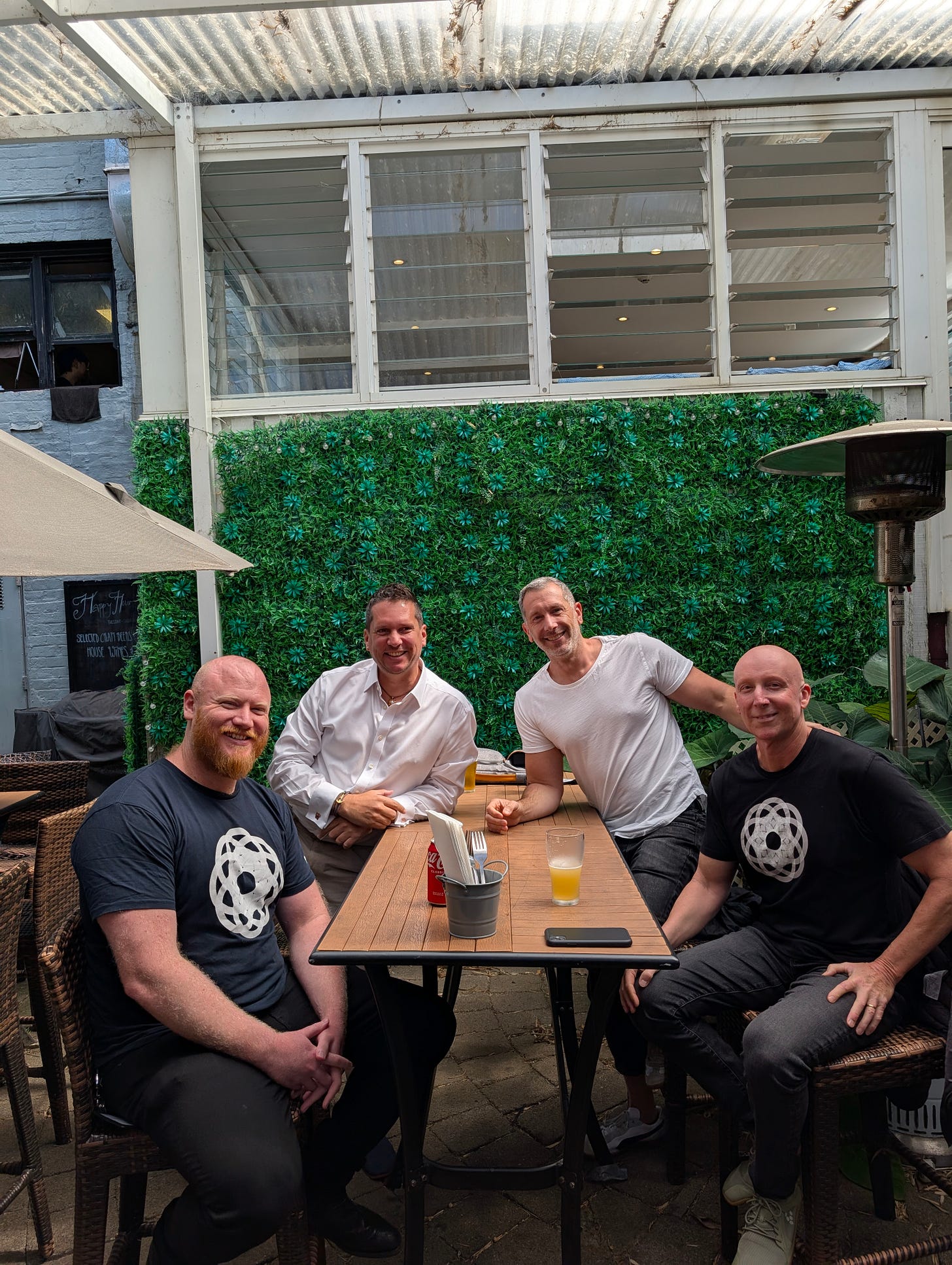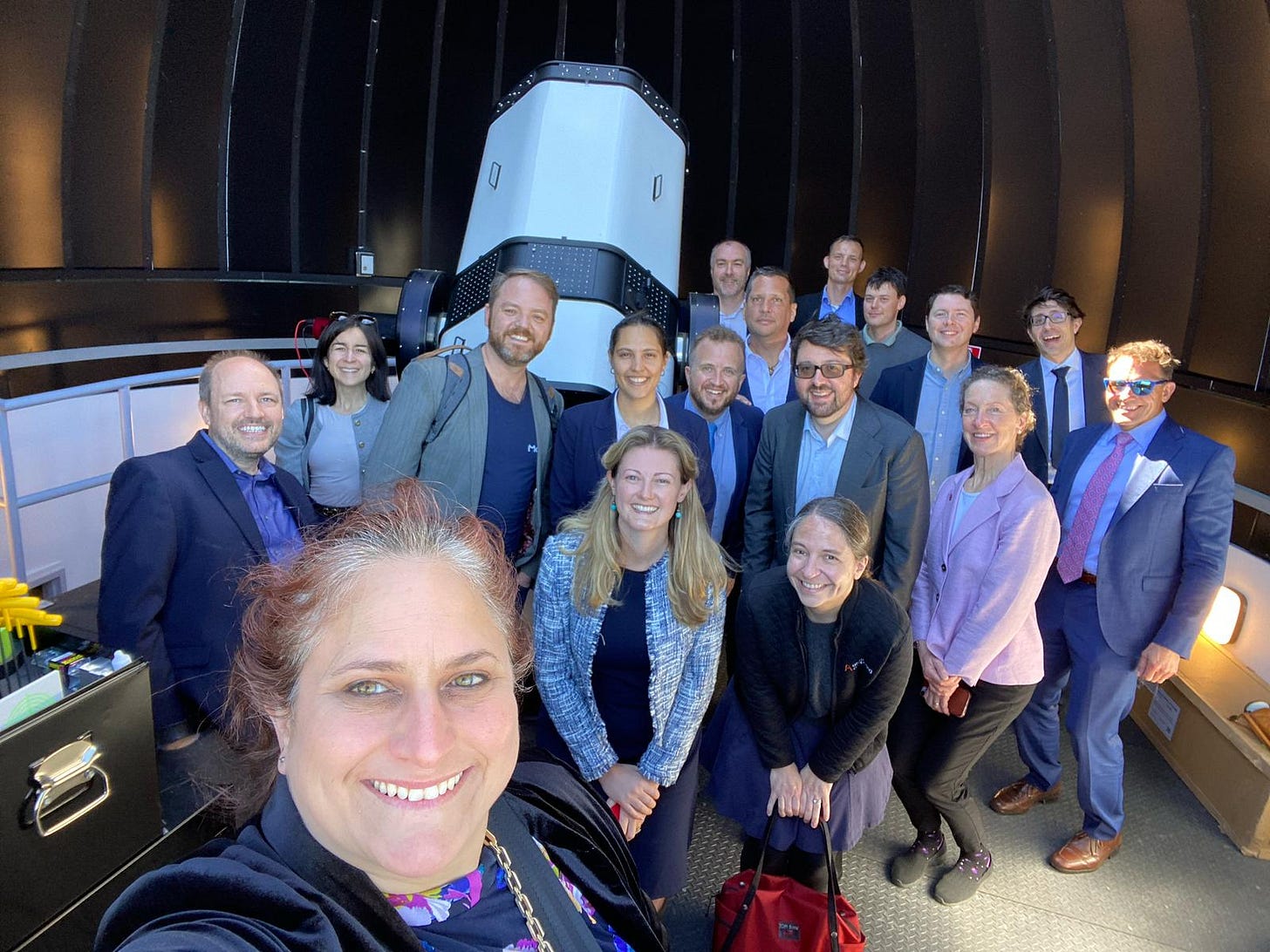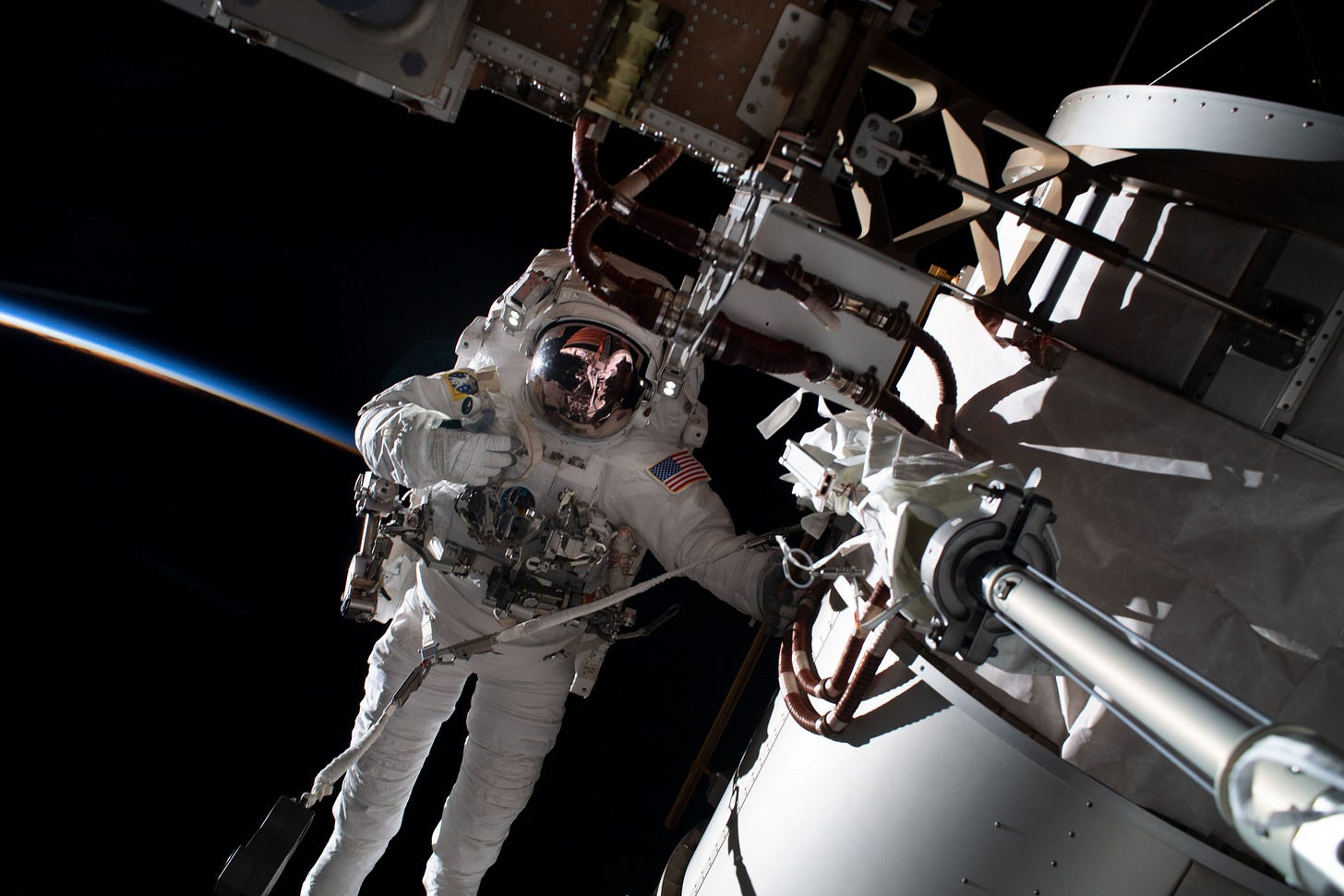Dispatch from Down Under ✈️ Quantum Diplomacy in Action
Strengthening the US-Australia Quantum Corridor
I recognize the aboriginal people of Australia, the oldest living culture in the world, as the original custodians of the land that I am currently writing this on. Stanford historian Mikael Wolfe argues that technology and nature are usually thought of as opposites, but he advocates for what is known as an envirotech approach to the historical relationship between the two – technology and the environment should be seen as interconnected. Australia’s national research institute, CSIRO, has a significant research effort around quantum biology, using our understanding of quantum mechanics to help explain some of the more complex and subtle biological processes that occur in nature, recognising that quantum does very much ‘play out’ in biological systems even if we don’t yet realise exactly how.
Hello friends,
I am just returning from a whirlwind journey that took a QED-C delegation across the sun-drenched coasts of Brisbane and Sydney, Canberra (sans coast but avec sun) and Melbourne, where kangaroos and koalas weren’t the only national treasures. Australia’s quantum ecosystem — nimble, ambitious, and globally-minded — is clearly punching above its weight (bingo!!!).
Led by the Quantum Economic Development Consortium (QED-C), a U.S.-based public-private partnership formed under the National Quantum Initiative Act. It unites industry, academia, and government agencies with around 250 active members, including many international ones. Its mission can be articulated around three main goals (1) be the trusted voice of the industry (2) engage and empower members and (3) inform and influence policy — laying the groundwork for a thriving global quantum economy.
This was diplomacy, innovation, and investment strategy wrapped into a fast-paced, multi-city 2 week sprint — a reconnaissance mission aimed at catalyzing the next wave of quantum partnerships between the US and Australia.
And a learning opportunity to realize that we at GQI know a lot about quantum tech and that our expertise is truly appreciated by the ecosystem. But, really, we actually know absolutely nothing about quantum tech and need to continue to work very hard to call ourselves experts. The leading vendors are extremely smart, collaborative and thoughtful in building - I am most appreciative of the many deep and confidential conversations that I had with my fellow delegates during bus transfers, airport rides, dinners and lunches, in between lab visits, roundtables and meetings. Quantum tech is in good hands!
🧭 The Mission
Led by the Quantum Economic Development Consortium (QED-C) and Austrade, our US delegation brought together quantum heavyweights like IBM, IonQ, Nvidia, PsiQuantum, Rigetti, IonQ, QuEra, Atom Computing, Quantum Opus, Keysight Technologies and more — flanked by policy minds from the US State Department and thinkers from CNAS and GQI.
Our objective was clear: map the contours of Australia’s rapidly evolving quantum landscape, deepen government-to-government dialogue, and explore commercial, academic, and geopolitical opportunities.
In a highly animated conversation with a senior executive at an Australian company, around quantum security, their CTO mentioned that “we have a bunch of classical threats that can hack us today. We need to fix those before we worry about PQC.” I didn’t know at that moment that this sentence would become emblematic of my experience during this trip - if you don't worry about PQC now then, in a few years, you'll have only one problem left, I responded. A very very big and definite one. The same is true for any quantum tech application. A stark reminder of how challenging it still is for an end-user to adopt quantum tech and a sentiment that was echoed in all conversations - not an issue confined to the island, though.
It was a privilege to have such high level, open and engaging conversations and I regard this as an opportunity. An opportunity for GQI to help educate users, investors and governments. And an opportunity for users to leapfrog years of innovation. Considering how immensely welcoming Australia has been, I am excited for us to play a small role down under going forward.
🌏 Queensland Rising
Brisbane wasn’t just our first stop — it was a revelation. The Queensland Government, in partnership with institutions like the University of Queensland (QUBIC and EQUS) and quantum-first players like PsiQuantum, is laying the groundwork for a quantum manufacturing hub that could rival anything we've seen globally. Whatever your take on them, I will say that PsiQuantum has vision and balls. And we need a lot more of that in quantum tech.
From government ministers to technical directors, it’s clear: Queensland is betting big on quantum, and they want international collaborators at the table.
Equally as exciting, especially since I was constantly reminded of it during sleepless nights in front of the Aussie news, the Olympic games are coming to Brisbane - and, with that, the Olympic quantum challenge. Anyone feeling like a gold medal winner?
🧠 Sydney: Capital Meets Capital
In Sydney, the pulse shifted to finance, venture, and scale. A high-powered roundtable with some of Australia’s leading financial services institutions revealed a sector keen on quantum’s risk modeling, encryption, and portfolio optimization potential. And a familiar end-user conversation.
We also connected with DeepTech innovators like Professor David Reilly, toured commercial quantum labs at Diraq and UNSW, and joined the Quantum Industry Day at NSW Parliament. The message? Sydney wants to be quantum’s commercialization capital.
🏛 Canberra: Quantum Meets National Security
Australia’s capital brought a different energy: geopolitical, strategic, and sovereign. In Canberra, we engaged directly with senior federal policymakers from various branches.
The discussions reflected how quantum is no longer just a scientific frontier — it’s a national security imperative. And at Australian National University, we witnessed how research is being translated into startups — like Quantum Brilliance, Nomad Atomics, Liquid Instruments, and QuintessenceLabs — with real-world, near-term use cases.
🎓 Melbourne: Deep Tech, Deep Talent
Our final stop was Melbourne, where the Victorian Government made a compelling case for its role as Australia’s quantum innovation engine. From policy visionaries at Invest Victoria and Breakthrough Victoria, to top research labs at CSIRO, ANFF, RMIT, and the University of Melbourne, we saw what happens when infrastructure, academia, and capital align.
Melbourne isn’t just researching quantum — it’s training the workforce that will build it. From the IBM Quantum Platform at Melbourne Connect to the cross-university talent roundtable, the city is investing in human capital at scale.
🔬 Australia’s Quantum Arsenal
Across Australia, our delegation immersed itself in the scientific depth and entrepreneurial energy that defines Australian quantum:
Visits to research powerhouses like UQ, ANU, RMIT, and the University of Melbourne revealed globally competitive research in photonics, sensing, and quantum software.
We saw a commercial layer taking shape: companies like Quantum Brilliance, Diraq, Liquid Instruments, QuintessenceLabs, and Nomad Atomics are scaling fast and thinking globally.
Governmental engagement wasn’t superficial — it was strategic. Agencies, CSIRO and various departments are aligning quantum with national security, industrial resilience, and economic diversification.
🤝 Building the Quantum Bridge
Roundtables, investor sessions, and government briefings weren’t just about information — they were about action. Key themes emerged:
Cross-sector quantum applications: From mining giants to financial behemoths, the appetite for quantum innovation is real.
Bilateral strategic alignment: The US and Australia are not just allies — they’re becoming quantum collaborators, with the US State Department emphasizing the centrality of this partnership to international tech policy.
Capital, talent, and IP flows: Innovators like Professor David Reilly and public entities like Breakthrough Victoria are opening doors for transpacific co-investment and co-development.
And AUKUS might have been in the room, too.
🧠 People Power
What makes this all possible? The people. From Prof. Warwick Bowen and Prof. Andrew White in Queensland, to Tim Senden at ANU and Lloyd Hollenberg in Melbourne, this is an ecosystem led by visionaries with one eye on the lab and the other on the global stage.
The same holds true for the government. Whether it was Rachel Howard and Jessica Richman at Austrade, or Esha Mathew and Brad Blakestad from the US side, the commitment to building bridges — scientific, diplomatic, and commercial — was palpable.
🇦🇺 Australia’s Quantum Growing Pains: What’s Holding Back the Ascent
That’s a sharp and essential question — one that echoes the kind of constructive skepticism that real partnerships are built on. While the QED-C delegation was rightly impressed by the breadth and energy of Australia’s quantum ecosystem, a close look reveals a few systemic challenges and blind spots that, if unaddressed, could hold back the country's full potential. Here's a candid synthesis, drawing on the meetings, conversations, and cues from across Brisbane, Sydney, Canberra, and Melbourne - all in the spirit of constructive feedback.
Fragmentation vs. Federated Force
Australia’s quantum ecosystem is geographically and institutionally fragmented. While each city boasts strength — Brisbane in hardware, Sydney in finance and spin-outs, Canberra in policy, Melbourne in talent — the national coordination often feels loose and improvisational.
The absence of a cohesive, singular narrative means it’s harder for Australia to position itself globally. Talent and funding still get stuck in silos. National branding of quantum capability is still emerging, but not yet cohesive.
The National Quantum Strategy provides a blueprint, but implementation will need deeper inter-state synchronization and an empowered, possibly independent national coordinator.
Scale, Not Science, is the Missing Ingredient
Australia’s quantum research is world-class, but commercialization is inconsistent. Many companies are in prototype mode, and those seeking scale are often dependent on non-Australian capital or markets.
There's a bias toward deep science over product thinking. Lab-to-market pipelines are not yet mature. Critical enablers — supply chains, system integrators, customer validation pathways — are often underdeveloped or missing entirely.
Breakthrough Victoria, Main Sequence Ventures, and ANFF are trying to build bridges — but the private capital market for quantum in Australia remains thin and we encountered some narrow minded views on the prospects and value drivers of quantum tech.
A (very) senior government official told me in a one on one conversation that the first 6-9 months he is busy dealing with the policies of his predecessor (Australia is currently in an election cycle). The last 18 months of his term he’s focused on elections. “What do you want me to do about it (aka quantum tech)?”
This wasn’t an admission of failure. Rather, it was an encouragement to the private sector to take leadership - it was clear from his other comments that they are ready to follow and fund initiatives where possible.
Risk Aversion in Government Procurement
The Australian Government is deeply interested in quantum — but not yet behaving like an anchor customer. Risk-averse procurement policies make it hard for startups to get local traction.
Without procurement-backed validation, it's tough for companies to scale, retain talent, or attract foreign investment. This is where countries like the US (via DARPA/DOE), Germany, and even Israel shine. DUI, especially, came up as an often cited model to replicate.
DSTG and CSIRO are experimenting with co-development models, but they need to push faster, with bolder procurement and clearer innovation mandates. When I suggested that a venture studio might help, for example, I was met with a shoulder closer in temperature to Siberia than the Gold Coast.
I developed somewhat of a refrain during our trip: “Don't start with use cases.” - to the bemusement of my friends representing various vendors. Start with an understanding that quantum is a new capability. Build skills, teams and expertise. Understand quantum tech as a once in a lifetime, if not more, opportunity, to change the course of progress (and do use cases with the vendors to learn but not for the ROI). But other than PsiQuantum few have the you know what for that.
Talent is Growing, But Brain Drain Lingers
Australia has a highly educated quantum workforce, but retention remains an issue. Many of the brightest researchers — especially PhDs and postdocs — end up overseas due to limited industrial opportunities.
Startups are struggling to hire at scale; universities often absorb talent into grant-based research without commercialization pathways. Immigration and visa frictions compound the issue for foreign-born talent.
Programs like Melbourne Connect, and the University Talent Roundtable, show growing awareness — but workforce planning needs to move beyond degrees and into industry immersion.
Why do I love the US? Because we play to win! That mentality needs to be adopted by our partners as well.
Quantum is Still a Buzzword in Some Boardrooms
While some sectors are starting to get serious, many industries are still playing buzzword bingo — touting quantum interest without a clear roadmap or internal expertise. This, to be fair, is not an Australian but a global problem.
Without real quantum strategies, a lot of industry engagement is surface-level. There's a need for “quantum fluency” training at the executive level across key sectors.
Some of the companies we met showed curiosity but not conviction. This isn’t a knock — it’s a symptom of a gap between scientific potential and operational relevance.
GQI, QED-C, and Austrade are trying to translate between quantum experts and sector leaders — but more systematic effort is needed here, possibly with industry-specific quantum accelerators. Said more bluntly, it’s great to invite experts but you also have to trust and listen to them otherwise what is the point.
During one of our roundtables a senior executive opined that “if I come to my CEO with anything other than a use case he won't even listen to me.”. My response to him “Then get a new CEO.” - this is how potentially transformative quantum tech is; fast following is a fallacy. Most users will be unable to understand that - a century defining opportunity for those who do.
Another senior executive observed that “we don't do quantum as tech for the tech. We do quantum for the use cases. I don't want to be an expert or build internal expertise.”. Natural selection at play, live in front of our eyes
If Australia is able to develop an audacious, national quantum identity — something the world can recognize as distinctly Australian, yet globally interoperable — then they can claim to be in a global pole position.
🚀 Where Do We Go From Here?
This visit wasn’t a victory lap — it was a launchpad. Australia is not waiting for the world to notice; it is actively shaping the global quantum map. And the US, through QED-C and strategic engagement, is making sure it’s not just watching but participating. So, what’s next? Expect to see:
More cross-border R&D partnerships
Joint commercialization programs
Increased VC activity on both sides of the Pacific
And hopefully... more visits like this one.
Quantum is no longer a niche science. It's a strategic axis (according to one minister we met a top 3 priority along AI and biotech) — and this trip to Australia reminded us just how global, ambitious, and collaborative our future needs to be.
☀️ Bright like the Australian sun
On my way back home I was lucky to be able to make a pit stop at Q-CTRL’s new office, meet the team, see some sensors and not a lot of errors. The team around the CEO Michael built a world leading business that I would describe as AI for quantum to maximize value across computing, sensing and applications, incl, education.
Q-CTRL maintains a broad international footprint through offices in Sydney, Los Angeles, and Berlin, supported by partnerships that span industry, government, and academia. Notably, they collaborate with leading quantum hardware developers — including IBM, IonQ, and Rigetti — to integrate Q-CTRL’s error-reduction and performance-enhancing software into a variety of quantum computing platforms. In the defense and aerospace arena, Q-CTRL has worked with organizations such as NASA’s Jet Propulsion Laboratory on advanced quantum sensing initiatives, while also engaging with U.S. defense agencies to explore secure and resilient quantum technologies. In Europe, their Berlin office facilitates alliances with research institutions and commercial partners to drive innovation in quantum control and sensing for next-generation applications.
These international projects reflect what’s possible coming from down under. Smartly using unique, local advantages as competitive differentiation, like the powerful R&D Tax Incentive Program (abused by others), which provids them with refundable and non-refundable tax offsets for qualifying research and development expenditures.
Investors like Main Sequence, a deep tech-focused venture capital firm born out of Australia's national science agency, the CSIRO, with a mandate to back science-led breakthroughs, provided early-stage funding and strategic support, helping to nurture and commercialize quantum innovations that originate in Australia’s research labs.
And a deep bench of world-class talent. All of which combined makes Q-CTRL a global leader in quantum tech.
On a personal note, this trip was super special - a genuinely kind, fun and uber smart group of people who invested a lot of time, hard work and knowledge into furthering quantum tech globally - and some good fun along the way.
The team from Austrade with Jessica, Rachel and Vish is awesome. Their kindness was only surpassed by the level of access they afforded us and the most professional logistics. If you are interested in Australia (and you should be!) hit them up.
And if you're not a member of the QED-C then you must join - it's open to organizations globally. Celia truly loves her job and has a bold vision; it was a privilege to be part of her first delegation and a joy to spend time with her. Very grateful to her and the team to make this possible.
As Josh Cassada said, when I asked him about his experience in space, “we all won the lottery of the universe living on this beautiful little blue planet and don’t even realize it.”
Until next time,
#QuantumIsComing
This is my personal newsletter, all opinions are mine and do not represent GQI, The Quantum Computing Report and other affiliated entities.








